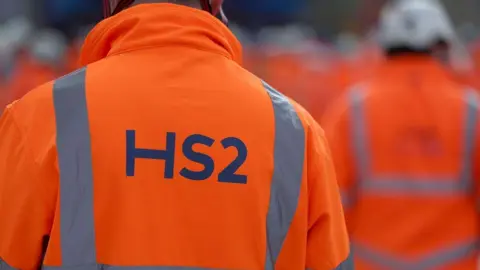The High-Speed 2 (HS2) rail project, which aims to connect London and Birmingham through a new high-speed railway line, is currently facing an investigation regarding the practices of some labour suppliers involved in its construction. HS2 Ltd, the company responsible for the project, has launched an inquiry into allegations surrounding two firms that supply workers for building the West Midlands segment of the line. This investigation touches on serious concerns about billing practices related to the personnel provided for this ambitious infrastructure project.
The allegations were first reported by the i newspaper and point to issues such as the misclassification of staff and claims that inflated billing rates were charged for workers. This situation raises significant concerns not only about the financial administration of the project but also about ethical practices within the supply chain. The Department for Transport has been quick to assure the public that it will thoroughly investigate any claims of wrongdoing within HS2’s supply chain, stating their commitment to ensuring accountability and transparency.
The ongoing inquiry has been noted to include serious measures taken by HS2 Ltd. According to a spokesperson for the organization, they treat whistleblower allegations with utmost seriousness, indicating that multiple layers of monitoring and controls have been implemented by Balfour Beatty Vinci, one of HS2’s significant contractors involved in the project. As a part of precautionary measures, it has been reported that one of the labour suppliers under scrutiny has been suspended from engaging in new contracts until the investigation is concluded.
The systemic issues raised during this inquiry are a reflection of broader challenges often faced in large-scale construction projects. The government has a clear stance on this matter, as conveyed by a spokesperson for the Department for Transport who emphasized that there is a zero-tolerance approach towards issues like fraud, bribery, and corruption within projects such as HS2. Such diligence comes at a time when HS2 is subject to heightened scrutiny, amid rising costs and operational inefficiencies reported during its development.
This investigation’s timing is particularly pertinent as work continues on the HS2 line, which has been under construction since the project was originally announced in 2009. Initially planned to be completed in two phases, the first phase will link London to Birmingham, while the second was intended to extend the line to Manchester and Leeds. However, rising costs and various setbacks have led to the abandonment of the latter phase by the previous Conservative government, a decision that has been maintained by the current Labour government.
Currently, a significant portion of the London-Birmingham segment of the HS2 line, particularly tunneling work, has been completed, claiming more than 75% completion. Compounding the challenges of the HS2 project, there are community and infrastructure proposals emerging, such as the plan advanced by the mayors of Greater Manchester and the West Midlands to develop a new rail line connecting their regions, which would be structured through private investment and touted as a cost-efficient alternative to the scrapped northern increments of HS2.
Throughout the years, official estimates of HS2’s total costs have fluctuated, often leading to public skepticism and criticism. When first introduced, estimates poised the cost for the London to Birmingham Phase at approximately £20.5 billion in 2012 prices. Most recently, government assessments have raised that estimate to between £45 billion and £54 billion in 2019 prices, while internal management projections hover around £49 billion to £57 billion. Contributing factors to these budget overruns include inflation, project management inefficiencies, and unexpected ground conditions.
In summary, the investigation into the practices of labour suppliers within the HS2 project captures ongoing concerns regarding accountability, ethics, and cost management in one of the UK’s most ambitious transport undertakings. The outcomes of this inquiry could wield significant implications, not just for HS2’s execution but for the industry’s broader practices concerning labour and contractual integrity.



